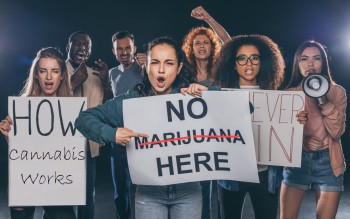
Why unlimited access to Drug Research should be unrestricted
Since 1971, the landscape of drug research in the United States has been drastically altered, with severe restrictions placed on the study of substances deemed "most dangerous." The Controlled Substances Act (CSA), ostensibly implemented for public protection, has instead created a system that inadvertently benefits pharmaceutical companies by maintaining their monopoly on drug manufacturing and distribution.
At the heart of this issue lies Schedule I, the most restrictive category of the CSA, where cannabis currently resides alongside substances like heroin and LSD. The classification of drugs in this schedule renders them nearly impossible to study, requiring special permission from the Drug Enforcement Administration (DEA) - a privilege rarely granted. This barrier to research has significantly hampered our understanding of these substances and their potential benefits.
Moreover, the limited studies that do receive approval predominantly focus on the negative effects of drugs like cannabis, rather than exploring their potential therapeutic applications or positive impacts on health and wellness. This skewed approach to research leaves significant gaps in our knowledge and understanding of these substances.
In this article, we will make the case for unrestricted access to drug research across all categories. We argue that encouraging comprehensive studies, especially on substances currently classified as dangerous, is crucial for maximizing awareness and minimizing risks associated with their use. By removing these arbitrary barriers to scientific inquiry, we can foster a more informed and nuanced approach to drug policy and public health.
Let's delve into why unlimited access to drug research is not just beneficial, but necessary for progress in medicine, public health, and social policy.
A quick look at the Scientific American Article
This article was inspired by an article I read in the Scientific American. In order to be on the same page, I’ve quickly run down some of the more salient points of the article itself.
The article "Marijuana's New Legal Status Must Spark More Research" discusses the recent proposal by the U.S. Drug Enforcement Administration (DEA) to reclassify marijuana as a less dangerous drug, moving it from Schedule I to Schedule III within the Controlled Substances Act. This change would effectively make marijuana legal with a prescription and potentially ease restrictions on research.
The author argues that while this is a step in the right direction, it doesn't go far enough. They state, "It should end with the complete removal of research barriers nationwide, and the DEA action is a beneficial step in that direction."
Key points from the article:
Current legal status:
-
38 states support medical use of marijuana
-
24 states plus Washington, D.C. allow recreational use
Risks and vulnerabilities:
The article highlights concerns about marijuana use among vulnerable groups, including "the unborn, children and teens, for whom marijuana can interfere with brain development, as well as individuals with mental health disorders."
Research barriers:
Despite widespread availability, significant hurdles to marijuana research remain. The author argues for complete removal from the schedule of drugs, stating, "That would make marijuana fully research-accessible—a status commensurate with recreational marijuana in many states."
Complexity of cannabis:
The article notes that cannabis plants have "a complex chemistry with more than 540 identified compounds," including over 100 cannabinoids and 150 terpenes. This complexity makes standardized research challenging.
Current FDA approvals:
"The only FDA-approved psychoactive cannabinoids are the pure, synthetic THC mimetics (molecules that imitate and work like THC) called dronabinol and nabilone, with other molecules in the pipeline."
Potential benefits of rescheduling:
If successful, rescheduling could lead to "a substantial revitalization of entrepreneurial and research investments into marijuana." Researchers would benefit from simplified licensing, reduced security requirements, and less administrative paperwork.
Research gaps:
The article highlights the lack of large multicenter clinical studies, noting that "Large multicenter clinical studies, the gold standard for medical research examining marijuana for therapeutic purposes, are lacking as a result of high costs, regulatory hurdles, limited supply, complex approval processes, funding challenges and stigma over the past five decades."
Focus of current research:
"A significant proportion of clinical trials remains focused on physical and mental impairment linked to marijuana instead of ways it could cure diseases."
The author concludes by emphasizing the need for unrestricted research access to marijuana, stating, "Full research access would be ideal and should be considered as the next step."
Overall, the article advocates for a more comprehensive approach to marijuana research, arguing that the proposed rescheduling, while positive, is insufficient to address the current gaps in scientific knowledge about marijuana's potential risks and benefits. The author calls for removing all barriers to research to ensure public health and safety as marijuana becomes increasingly available across the United States.
Why we should have unfettered access to research drugs
When considering the most dangerous substances, one might assume that comprehensive research would be a top priority. After all, if a drug poses significant risks, shouldn't we strive to understand it as thoroughly as possible? Paradoxically, our current system often restricts research on the very substances we need to know the most about.
The logic behind limiting research on dangerous drugs is fundamentally flawed. How can restricting knowledge make a drug safer? Without robust scientific data, our understanding of a substance's "danger levels" becomes speculative at best and misleading at worst. This lack of empirical evidence undermines the entire premise of drug categorization, rendering it susceptible to political and ideological influences rather than being grounded in scientific fact.
We must ask ourselves, "Why restrict research in the first place?" The answer may lie in the inconvenient truths that unrestricted research could reveal. Take, for instance, the classification of cannabis, LSD, and psilocybin under Schedule I of the Controlled Substances Act. This category claims these substances have no medical value and a high potential for abuse. However, recent studies have demonstrated that this classification is factually incorrect.
Psilocybin has shown remarkable promise in treating depression, cannabis has proven beneficial for PTSD patients, and LSD has demonstrated potential in fostering psycho-spiritual development, helping individuals accept mortality, and breaking through mental blocks. Yet, for over five decades, research into these substances has been suppressed while pharmaceutical companies have been free to develop and market other drugs, often with taxpayer funding.
This suppression of research raises serious questions about the true purpose of the Controlled Substances Act. Is it really about protecting society, or is it a political weapon designed to maintain the status quo and protect certain interests? The American public deserves accurate, comprehensive research on all substances, regardless of their current legal status.
The mere existence of restrictions on drug research should be a red flag. It suggests that there's something to hide, or at the very least, a fear of what unrestricted research might reveal. This approach runs counter to the principles of scientific inquiry and evidence-based policymaking that should be at the heart of our drug policies.
Unfettered access to drug research is not just desirable; it's essential for public health and safety. It would allow us to make informed decisions based on facts rather than fear or political agendas.
It would potentially unlock new treatments for mental health conditions and other ailments. Most importantly, it would ensure that our drug policies are rooted in science and reality, not in outdated ideologies or commercial interests. The American people deserve nothing less than the full truth about the substances that our laws so strictly control.
The Sticky Bottomline
If drugs are truly as dangerous as policymakers claim, one would expect unrestricted research to be not just allowed, but actively encouraged. The fact that this isn't the case speaks volumes about the true intentions behind the Controlled Substances Act (CSA).
For those in the know, it's clear that the CSA's primary function isn't public safety, but rather serving as Big Pharma's "slaver's contract." This legislation effectively grants pharmaceutical companies a monopoly on drug production and distribution while demonizing substances that could potentially hurt their bottom line. The financial stakes are enormous - when a state legalizes cannabis for medical use, Big Pharma reportedly loses around $10 billion annually as people switch to more effective, natural alternatives for their ailments.
We've seen groundbreaking research with substances like psilocybin, demonstrating its potential to treat depression and anxiety disorders effectively. These compounds have shown promise in reconnecting people with a sense of purpose or spiritual awareness. However, such breakthroughs threaten to disrupt the pharmaceutical industry's profitable pill-pushing agenda.
The very existence of restrictions on drug research is damning evidence that these policies do not serve the average American's interests. Instead, they protect the profits of giant corporations who weaponize policy to maintain their dominance in the drug market. It's time we recognize Big Pharma for what it truly is - a legal drug dealer operating with government protection.
The bottom line is sticky indeed: our current drug policies are not designed to protect public health or safety, but to protect corporate profits. It's high time we end this pharmaceutical monopoly and demand unrestricted access to drug research. Only then can we hope to develop truly effective, safe, and accessible treatments for the myriad health challenges facing our society. The American people deserve better than to be pawns in Big Pharma's profit-driven game. It's time for a radical rethinking of our approach to drugs, research, and healthcare - one that prioritizes scientific truth and public wellbeing over corporate interests.
DRUG RESEARCH BY THE US GOVERNMENT, READ ON...
THE FEDS SPEND $1.5 MILLION ON MUSHROOMS FOR ADDICTION RESEARCH!







